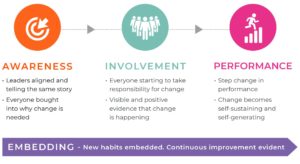
A ‘double whammy’? Hybrid working and the potential culture impacts of the cost of living crisis
The cost of living crisis in the UK is starting to bite: inflation is sitting around 10%, and energy bills are rising sharply. For most people, these additional costs have outweighed any recent or expected pay increase. And although the crisis hits the lowest paid hardest, many middle-income earners are also finding it harder to balance household budgets, leading to difficult choices or additional debt.
The crisis is something of a ‘double whammy’ for businesses: not only are they facing significantly higher costs themselves, but they are also having to support employees who are concerned about their personal financial circumstances, with potential implications for their well-being and engagement at work. As with households, some businesses are disproportionately impacted, including those with significant energy use and smaller companies. For example, recent data from the Federation of Small Businesses shows that 96% of small enterprises are concerned about the impact of high energy prices on their ability to operate.
In April 2022, the CIPD reported that 28% of employees felt that money worries had impacted their ability to do their job; the figure is likely to be considerably higher now. And despite the additional support for households announced by the Government on 8 September – and the promise of similar support for businesses over the winter (yet to be detailed, at the time of writing) – the impact is likely to be significant and sustained.
How might the cost of living crisis affect your organisation’s culture?
The potential impacts of the cost of living crisis on organisational cultures are yet to become fully clear, but they could be significant, and – without intervention – are likely to be unintentional.
By considering the potential culture consequences now, particularly with regard to hybrid working, you can help guide and shape any changes to help ensure they’re supportive of the culture your organisation wants and needs.
Cost of living and hybrid working
Increases in the cost of living may impact individuals’ preferences around hybrid working. It’s been reported that – where hybrid working is available – UK workers are going into the office an average of one and a half days per week. In many cases, this is less frequent than their organisations would ideally like.
However, it’s become much more expensive to heat our homes and as winter starts to draw in, a well-heated office may feel more appealing than a chilly house or flat. Anyone who’s tried it knows it’s really hard typing in gloves, Bob Cratchit-style, and the internal warming effects of porridge only last so long.
Of course, the additional cost of working from home depends on a range of factors. Most reports estimate the additional heating costs from homeworking to be at least £50 per month over the winter. (N.B. Some media reports estimated the additional monthly cost to be over £200, but these calculations have since been challenged). The actual amount depends on energy usage and how it’s supplied: employees living with health conditions may require central heating all day, for example, whilst others might be able to cope without turning it on at all. And whether people choose to visit the office more regularly to avoid additional costs at home will also depend on their commuting costs and the extent to which these are fixed (e.g. through a season ticket) or variable.
Certainly, cost and financial circumstances are likely to become a significant driver for some people when deciding their optimal hybrid balance. Yet it’s unlikely to be clear-cut, making it harder for organisations to plan, as described in this article from the Guardian:
“One public sector graduate trainee told me that, by her calculations, the cost of train fares, coffees and snacks left her better off working from home. But if energy costs rise sharply, she will probably switch to travelling into the office over shouldering a punitively high heating bill… Another senior manager working for a London local authority told me that while some of her staff had indicated that they might want to be coming into the office more often in the coming months, there was a lack of concrete information or certainty.”
Moreover, conversations about money and financial situations can feel uncomfortable in the workplace. People may feel hold back from talking about money-related concerns, and – if they’re choosing to come into the office more – may not want to explain why. For those working remotely some or all of the time, money-related concerns and any impact on work may be even harder to identify.
Steps you can take to support your hybrid working approach in light of the cost of living crisis
Pecan Partnership’s Awareness to Embedding framework can help you ensure that the impacts of the cost of living crisis are consciously factored into your hybrid working arrangements.

Awareness:
- As an organisation, acknowledge the impact that the cost of living crisis is having on households, and the potential implications for employees’ choices around hybrid working, and knock-on impacts for organisational culture
- Use the opportunity to revisit how hybrid working is helping to drive your culture, and how that might change
- Raise awareness of any support or advice available to employees
Involvement:
- At a team level, create and maintain a conversation around hybrid working preferences, without requiring people to explain their rationale if they feel uncomfortable doing so
- Ensure there are ways in which people can flag up their concerns anonymously
- Consider low-cost opportunities to reinforce and promote organisational values, both in the office and for those working at home
- If office space is at a premium, involve people in developing contingency plans
Performance:
- As an organisation, monitor outcomes such as productivity and quality of work as well as employee engagement and well-being (which may be early indicators of cost of living challenges impacting on work), as well as input factors such as whether people are working at home or in the offic
- Ensure that managers are able to signpost their people to additional support where required
Embedding:
- As an organisation, keep your hybrid working approach under regular review, with input from employees to ensure a diverse perspective
- Monitor ongoing developments regarding the cost of living, and factor these into your hybrid approach
Our Awareness to Embedding approach can help you consider and respond to the potential culture consequences of the cost of living crisis. To find out more, get in touch.
For organisations looking to support their employees manage the cost of living crisis more generally, the CIPD provides useful guidance, including resources to review benefits strategies, and help employees build their financial literacy.
